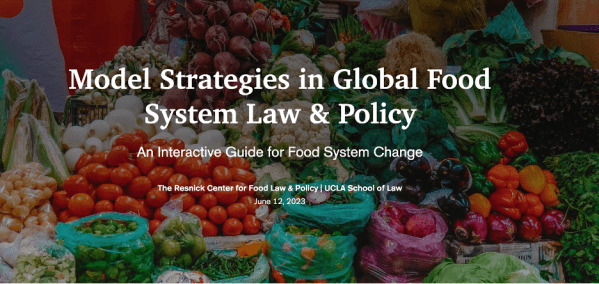by Alexa Libro*
Earlier this year, I had the pleasure of attending CLE International’s 6th Annual Food Law Conference. I vividly remember attending the previous food law conference in San Francisco in February of 2020, deliberating on whether it was appropriate to shake hands and how often to use hand sanitizer. A lot has changed since then, including food law. This evolution of food law was demonstrated in every session of this year’s food law conference. Ann Oxenham, the Acting Director of the Office of Compliance in the Center for Food Safety and Applied Nutrition (CFSAN) at the US Food and Drug Administration spoke of tech-enabled traceability as a part of the FDA’s new era of smarter food safety. The General Counsel Roundtable session exemplified how food businesses had to adapt to navigate supply chain issues, labor issues, and remote work. Thus, ending the conference with a session on the future of food law was the perfect way to reflect on how food law has evolved and surmise its next evolution.
In the Future of Food Law session, Michael Roberts, the Executive Director of the Resnick Center, moderated a conversation with two of his former students, Evan Graham Arango and Jason Lawler. The conversation illustrated why food is currently top of mind for everyone, not just food lawyers. The pandemic forced us to think about where our food comes from. For many, it was the first experience with gardening or baking bread. For many, it was the first experience not finding numerous items on a grocery list. For many, it was the first or worst experience with food insecurity.
Evan Graham Arango, the owner, founder and farmer at Ojai Roots Farm in Ojai, California noted people’s interest in regenerative agriculture and eating locally. I’m speculating that many people, like me, watched documentaries about regenerative agriculture, such as Kiss the Ground and Biggest Little Farm, when they were stuck inside, and were inspired. Regenerative agriculture and its potential to sequester carbon from the atmosphere brings to the forefront the connection between our food system and climate change
Jason Lawler, an associate at Sidley Austin LLP, elaborated on how his work around the business of food interfaces with climate change realities. Businesses are aware that consumers vote with their wallets, which encourages existing businesses to voluntarily offset carbon and new businesses to form with the goal of sequestering greenhouse gases.
Michael Roberts posits that the future of food will revolve around information. As artificial intelligence gives us more insights into what to grow, how to grow it, where to grow it, and when to market it, he wonders how to democratize that information and ensure fairness in data collection and ownership. As a consumer, I wonder how all that information will be relayed to me so I can make good food choices. To all the current and aspiring food lawyers, I look forward to seeing how we navigate the future of food law and reflecting on our progress at the next food law conference.
*Alexa is graduating this year from UCLA Law. She graduated from UCLA with a BS in neuroscience with highest honors and a minor in biomedical research in 2017. At UCLA School of Law, she has been coexecutive chair of the Food Law Society and is currently chief managing editor of the Journal of Environmental Law & Policy. She is also a research assistant with the Resnick Center.











You must be logged in to post a comment.